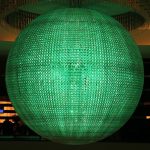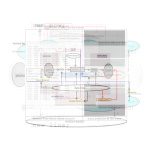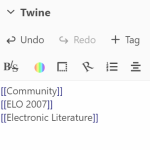electropoetics
María Mencía’s e-Poetry: A Conversation Exploring Her Work

In this conversation with Yolanda De Gregorio Robledo, e-poet María Mencía discusses her journey as an artist and scholar. In doing so, María reveals her artistic interests, the influences the electronic literature community has had on her work, and the importance of highlighting women's contributions to the field of electronic literature as a whole.
Call for contributions for special issue “Celebrating Joseph Tabbi and 30 Years of electronic book review”

A special call for papers celebrating the work of Joe Tabbi—electronic book review's founder and long-term editor-in-chief—which will be published in a special issue of electronic book review during the journal's 30th anniversary year.
ebr at the crossroads

The electronic book review Editorial Team discusses electronic book review's 30th anniversary, the journal's position at the junctures of multiple academic disciplines, the threat of an increasingly turbulent global stage, and the aspiration to continue providing a home for a future defined by resistance and unity.
The Praxis of the Procedural Model in Digital Literature, Part 2: Applications

Part 2 of Philippe Bootz's exploration of the procedural mode in digital literature, continued from part 1.
A Personal Twine Story

In a keynote delivered at ELO 2024, Chris Klimas recounts ELO 2007 and the creation of Twine. In doing so, he highlights the importance of community and open-source software in fostering digital creativity, while pondering the possibility of a platform dark forest.